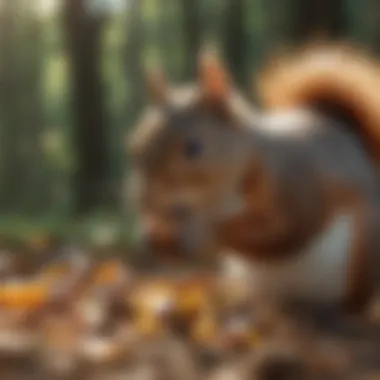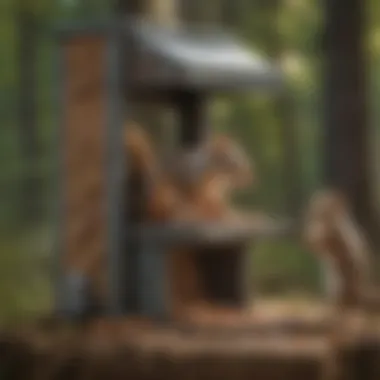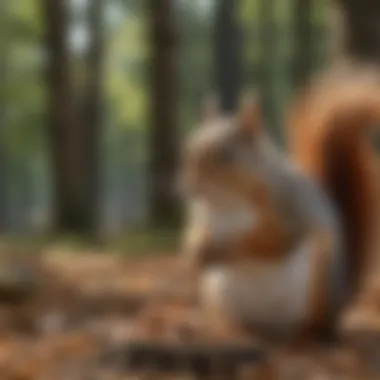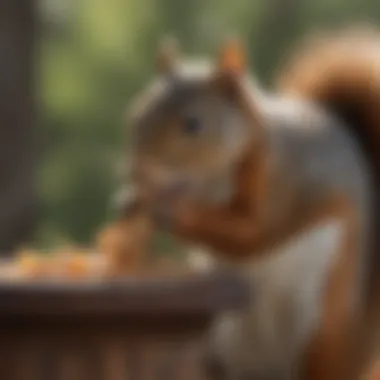Providing Optimal Nutrition for Squirrels in Outdoor Environments: A Comprehensive Guide


Overview of the Topic
Feeding squirrels in outdoor environments is a matter requiring meticulous attention to detail. It is crucial to understand the significance of providing these furry creatures with proper nutrition to maintain their well-being and the ecosystem's balance. Squirrels play a vital role in seed dispersal and forest regeneration, making their nutritional support a key aspect of wildlife conservation efforts.
Current Status and Challenges
The current state of feeding squirrels presents both opportunities and challenges. While providing food for squirrels can foster human-wildlife connections and contribute to biodiversity awareness, it also poses risks such as dependence on human-provided food sources and potential conflicts with other wildlife species. Additionally, improper feeding practices may lead to health issues for squirrels and disrupt natural foraging behaviors.
Sustainable Solutions
Exploring sustainable solutions for feeding squirrels is essential in promoting coexistence between humans and wildlife. Implementing species-appropriate diet plans, using squirrel-proof feeders to reduce food competition, and incorporating natural foraging opportunities can help mitigate the negative impacts of feeding wildlife. By fostering responsible feeding habits and creating a safe feeding environment, individuals can actively contribute to supporting squirrel populations in a sustainable manner.
Impact and Importance
The impact of proper nutritional support for squirrels extends beyond individual animals to the broader ecosystem. By ensuring squirrels receive adequate nutrition, we uphold their role as seed dispersers and agents of forest regeneration, ultimately preserving biodiversity and ecosystem health. Conservation efforts aimed at promoting ethical feeding practices contribute to environmental sustainability, benefiting not only current wildlife populations but also future generations who rely on a balanced and thriving ecosystem.
Understanding Squirrel Behavior
Squirrels are fascinating creatures that play a crucial role in maintaining ecological balance. Understanding squirrel behavior is essential in ensuring their well-being and coexistence with humans. By delving into their foraging habits and social interactions, we can provide better nutritional support and create safe environments for these wildlife beings.
Foraging Habits
Squirrels primarily rely on a natural diet that includes nuts, seeds, fruits, and vegetation. This diet is rich in essential nutrients and reflects the dietary preferences of squirrels in the wild. Understanding the natural diet of squirrels helps us mimic their dietary needs when providing supplemental food, promoting their overall health and vitality.
Human intervention has influenced squirrel foraging behavior by altering their access to food sources. While some interventions may benefit squirrels by providing additional food options, they can also disrupt their natural foraging instincts. Balancing human intervention with the preservation of natural foraging habits is crucial to maintaining the well-being of squirrel populations.
Social Interactions


Squirrels engage in complex communication within their communities, using various vocalizations and body language cues to convey information. Understanding these communication patterns enables us to appreciate the social dynamics within squirrel groups and how they cooperate to ensure collective survival.
Conflict resolution is another significant aspect of squirrel social interactions, where squirrels employ strategies to resolve disputes and maintain peace within their communities. Observing these behaviors provides insights into how squirrels negotiate challenges and maintain harmonious relationships for group cohesion.
Benefits of Feeding Squirrels
As we delve into the essential topic of the Benefits of Feeding Squirrels in this in-depth guide, it is crucial to understand the profound impact this aspect has on supporting wildlife health and behavior. By supplementing the natural diet of squirrels, individuals can play a vital role in enhancing nutrient intake and sustaining squirrel health during periods of scarcity. This section will illuminate the significant benefits of feeding squirrels, including the insights gained into squirrel behavior and the connection established with nature through observation.
Supplementing Natural Diet
Enhancing Nutrient Intake
Discussing the specific element of Enhancing nutrient intake, we recognize its substantial contribution to the overall wellbeing of squirrels. By focusing on enriching their diet with essential nutrients, we aim to sustain their overall health and vitality. The key characteristic of Enhancing nutrient intake lies in its ability to provide a well-rounded diet that complements the natural food sources available to squirrels. This choice is instrumental in ensuring optimal nutritional support for these furry critters, although it requires careful consideration to avoid any potential drawbacks.
Supporting Squirrel Health During Scarcity
Turning our attention to Supporting squirrel health during scarcity, we address the vital aspect of ensuring squirrels receive adequate nutrition during challenging times. This contributes significantly to the overall welfare of these creatures, especially when natural food sources are limited. The key feature of Supporting squirrel health during scarcity involves offering supplementary support to sustain their health and vitality even when resources are scarce. While this approach provides undeniable advantages in supporting squirrel populations, there are potential risks associated with creating dependency on human-provided food that must be carefully managed.
Opportunities for Observation
Insights into Squirrel Behavior
Exploring Insights into squirrel behavior opens a window into the hidden world of these charismatic creatures. By observing their behavior closely, one can gain valuable insights into how they interact with their environment and each other. The key characteristic of this aspect lies in the opportunity it provides to understand squirrel dynamics and habits on a deeper level. By offering a unique perspective on squirrel behavior, individuals can enrich their appreciation for these animals and foster a sense of connection with the natural world.
Connecting with Nature Through Observation
The significance of Connecting with nature through observation cannot be understated in fostering a bond with the environment. By immersing oneself in the observation of squirrels in their natural habitat, individuals can cultivate a profound connection to nature. The key characteristic of this activity lies in the sense of awe and wonder it evokes, as observers witness the beauty and complexity of the natural world unfolding before their eyes. While this experience offers immense advantages in promoting environmental awareness and conservation efforts, it also requires a level of commitment and patience to reap its full benefits.


Ethical Considerations
In the realm of feeding squirrels, ethical considerations hold paramount importance. This article delves into the essential aspects of upholding ethical standards when providing nutritional support to wildlife. By adhering to ethical guidelines, individuals can ensure the well-being of squirrels and maintain a balanced ecosystem. Ethical considerations encompass various elements such as respecting wildlife boundaries, minimizing human interference, and preventing harm to the natural habitat.
Respecting Wildlife Boundaries
Maintaining a Non-Intrusive Approach
Maintaining a non-intrusive approach towards interacting with squirrels plays a crucial role in ensuring their safety and minimizing disruptions to their natural behavior. This approach involves observing squirrels from a distance, using non-threatening gestures, and avoiding direct contact or unnecessary disruptions. By maintaining a non-intrusive stance, individuals can foster a sense of trust and comfort among squirrels, leading to more authentic observations and interactions. The key characteristic of maintaining a non-intrusive approach lies in its ability to promote wildlife well-being without imposing undue stress or alterations to their habitat. Adhering to this approach illustrates a respectful attitude towards squirrels and contributes to a harmonious coexistence between humans and wildlife.
Understanding Limitations of Human-Wildlife Interaction
Understanding the limitations of human-wildlife interaction is essential when engaging with squirrels. This awareness involves recognizing that while interactions with wildlife can be enriching and educational, there are boundaries that must be respected to ensure the animals' best interests. Acknowledging these limitations helps individuals avoid overstepping boundaries, causing dependency, or disrupting natural behaviors. The key characteristic of understanding limitations in human-wildlife interaction is the ability to strike a balance between appreciation and restraint. By acknowledging these limitations, individuals can foster healthy relationships with wildlife while upholding ethical standards and promoting ecological sustainability. Understanding these boundaries is key to maintaining a respectful and ethical approach towards feeding squirrels and other wildlife.
Promoting Natural Foraging
In the context of feeding squirrels, promoting natural foraging practices is crucial for their well-being and ecosystem balance. By encouraging squirrels to rely on natural food sources, individuals can help maintain biodiversity and prevent exclusive dependency on human-provided food.
Balancing Supplementary Feeding with Natural Food Sources
Balancing supplementary feeding with natural food sources involves providing squirrels with additional nutrients while encouraging them to forage for their sustenance. This approach ensures that squirrels receive essential nutrients without becoming reliant solely on human offerings. The key characteristic of this balance is its ability to enhance squirrel health while preserving their foraging instincts and independence. By emphasizing a mix of supplemental and natural foods, individuals can support squirrel well-being while respecting their innate foraging behaviors.
Avoiding Dependency on Human-Provided Food
Avoiding dependency on human-provided food is vital to preventing squirrels from becoming reliant on handouts. By refraining from continuous feeding and creating situations where squirrels must seek out their own food, individuals can discourage dependency and promote self-sufficiency in these creatures. The key characteristic of this practice lies in its ability to maintain a sustainable feeding balance that allows squirrels to fulfill their nutritional needs independently. By avoiding overfeeding and fostering natural foraging behaviors, individuals can help squirrels thrive in their natural habitat while minimizing negative impacts on their health and behavior.
Creating a Safe Feeding Environment


Feeding squirrels in outdoor environments requires a keen focus on creating a safe feeding environment. This section delves into the pivotal aspects surrounding the establishment of a conducive setting for squirrel feeding. Emphasizing the significance of this topic is vital as it directly impacts the well-being and safety of these furry creatures. By delineating specific elements such as food placement, feeding schedules, and identifying potential risks, individuals can ensure a harmonious feeding environment that promotes the health and security of the squirrels.
Selection of Nutritious Foods
Ideal food options for squirrels
In the realm of feeding squirrels, the selection of ideal food options stands as a crucial determinant of their nutritional intake. Ideal food options encompass a range of nutrient-rich foods like nuts, seeds, and fruits that cater to the dietary needs of squirrels. Their high protein and energy content make them indispensable choices for promoting squirrel health and vitality. By offering a diverse array of ideal foods, individuals can contribute significantly to the nutritional support and well-being of the squirrel population.
Avoiding harmful or toxic foods
Within the domain of squirrel feeding, the avoidance of harmful or toxic foods emerges as a paramount consideration. Steering clear of foods such as chocolate, avocado, and high-salt content items is essential to prevent adverse health effects on squirrels. Understanding the detrimental impact of toxic foods and educating oneself on identifying and excluding such items from squirrel diets is imperative. By being diligent in avoiding harmful foods, individuals can safeguard the health and longevity of squirrels under their care.
Preventing Predation Risks
Strategies to minimize predator threats during feeding
Mitigating predation risks during squirrel feeding necessitates the implementation of strategic measures to deter potential threats. By employing tactics like installing squirrel-proof feeders, securing feeding locations, and minimizing attractants, individuals can reduce the vulnerability of squirrels to predators. These proactive strategies serve to create a protective environment that minimizes the risk of predation, ensuring the safety and security of the squirrel population.
Ensuring squirrel safety while feeding
Ensuring the safety of squirrels during feeding sessions entails a multifaceted approach that prioritizes their well-being. By monitoring feeding areas for potential dangers, supervising feeding sessions, and adopting precautionary measures, individuals can promote a safe feeding experience for squirrels. Guaranteeing squirrel safety not only fosters a sense of security for the animals but also reinforces responsible wildlife interactions, fostering a sustainable coexistence between humans and squirrels.
Conclusion
Feeding squirrels with proper nutritional support in outdoor environments is a crucial aspect of wildlife conservation. By providing adequate and balanced nutrition, we contribute to the well-being and survival of these furry creatures. The conclusion section encapsulates the essence of responsible feeding practices and emphasizes the significance of maintaining a harmonious ecosystem. It serves as a reminder to appreciate wildlife responsibly and underscores the importance of fostering respectful interactions with squirrels in their natural habitats.
Balancing Care and Caution
Appreciating Wildlife Responsibly
Appreciating wildlife responsibly involves acknowledging the intrinsic value of each living being within an ecosystem. It requires us to understand and respect the natural behavior and habitat of squirrels without disrupting their innate patterns. By appreciating wildlife responsibly, we enhance our connection to the environment and promote the coexistence of all species. This approach helps protect the delicate balance of nature and fosters a sense of stewardship towards wildlife. It is essential for conservationists, researchers, and nature enthusiasts to embody this ethos, ensuring the preservation of biodiversity and ecological harmony.
Maintaining Harmonious Interactions with Squirrels
Maintaining harmonious interactions with squirrels involves creating a positive relationship based on mutual respect and understanding. This entails avoiding behaviors that may harm or distress squirrels, such as excessive feeding or invasive interventions. By maintaining harmonious interactions, we enable squirrels to exhibit their natural behaviors while minimizing human impact on their environment. This approach fosters trust between humans and wildlife, paving the way for peaceful cohabitation and sustainable wildlife management practices. Overall, a harmonious relationship with squirrels benefits both the animals and the greater ecosystem, promoting biodiversity and environmental resilience.



